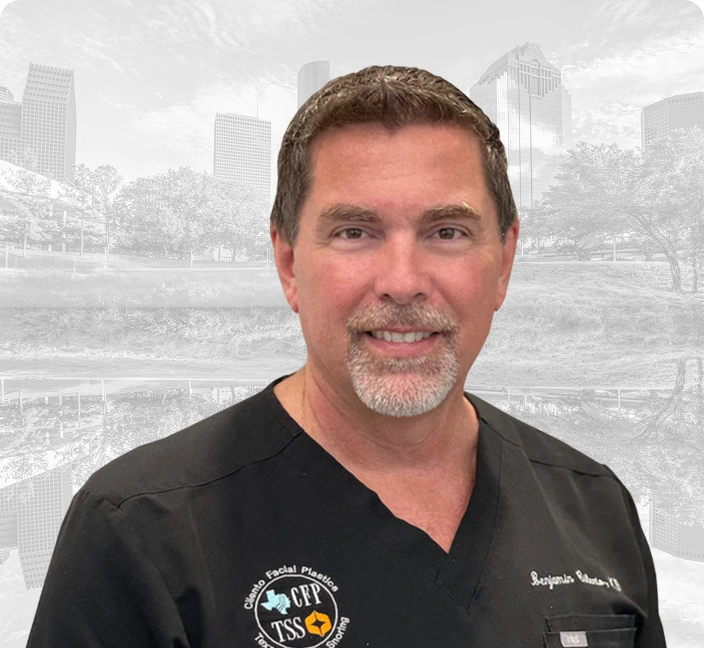What Is a Deviated Septum?
A deviated septum is a common condition where the thin wall inside your nose, called the septum, isn’t perfectly straight. The septum usually separates your nostrils, creating two equal passages for air to flow. But when it’s deviated, it leans more to one side, which can cause breathing problems and make one nasal passage feel smaller. It’s kind of like having a crooked wall in your house that blocks part of a hallway. Some people are born with a deviated septum, while others might develop it after an injury, like a bump on the nose while playing sports. If a deviated septum is causing issues, our doctors can fix it with a surgery called septoplasty.
How a Deviated Septum Affects Your Sleep
Waking up feeling unrested could be due to a deviated septum affecting sleep quality. Snoring can be a common issue caused by a blocked nasal passage. A deviated septum may also lead to sleep apnea, causing breathing difficulties during sleep. This issue, combined with tossing and turning due to discomfort and dry mouth from mouth breathing, can disrupt your rest. A deviated septum may also cause headaches from insufficient oxygen intake during sleep, further impacting your daily life.
What Is the Best Sleeping Position?
- Sleep on your side (preferably the unobstructed side): If one nasal passage is more open than the other, sleeping on the side opposite the blockage may improve airflow. This position can relieve pressure on the narrower passage and help you breathe freely throughout the night.
- Elevate your head: Use an extra pillow or a wedge pillow to raise your head slightly. Elevating your head helps reduce nasal swelling and drainage, preventing congestion and symptoms like postnasal drip or a runny nose.
- Avoid sleeping on your back: Lying flat on your back can cause the tongue and soft tissues to fall backward, potentially worsening snoring or even sleep apnea. It may also encourage mouth breathing, which can dry your throat and disrupt sleep.
- Do not sleep face-down: Sleeping on your stomach can put pressure on your nose and nasal passages, making breathing harder.
Additional Tips for Improving Sleep Quality
Use a Decongestant Spray
Use Nasal Steroid Sprays
Septum deviations can lead to chronic feelings of nasal congestion. Alterations in the airflow intake patterns lead to excessive mucus production, further narrowing the nasal passages. These developments can make a person feel highly congested and stuffed, worsen breathing difficulties, and affect daily functioning.
Use a CPAP Machine (Only With Prescription)
Use Oral Appliances for Sleep Apnea (If Diagnosed)
Other Tips
- Elevate your head: If you’re having trouble breathing through your nose, elevate your head with an extra pillow.
- Avoid alcohol and sedatives: Alcohol and sedatives can relax the muscles in the throat and worsen snoring and sleep apnea.
- Practice good sleep hygiene: Getting into a regular sleep routine and practicing good sleep hygiene can help. Make a routine, avoid caffeine and nicotine, and create a relaxing bedtime environment.
- Manage allergy symptoms: Allergies can inflame the nasal cavity, leading to a blocked nose and disrupted sleep. If you're sensitive to seasonal allergies or indoor triggers like dust mites, we recommend reducing exposure, such as using an air purifier, washing bedding regularly, and keeping windows closed during high pollen seasons. Managing these triggers can help keep your nasal passages clear and support better breathing at night.
Common Symptoms of a Deviated Septum
Difficulty Breathing
Nasal Congestion or Stuffiness
Frequent Nosebleeds
Facial Pain
Loud Breathing, Snoring, and Other Breathing Problems
Headaches
Postnasal Drip
Recurrent Sinus Infections
Correcting a Deviated Septum Through Surgery: Does It Work?
Surgery is often an effective way to relieve symptoms. And the type of surgery doctors recommend for a deviated septum is septoplasty. The procedure involves repositioning the septum and making it straight. This can help to open up the nasal passages and improve breathing.
Conclusion
If you are searching for medical facilities that offer deviated septum tests, treatment, and surgery, Texas Sinus & Snoring can help! Contact our ear, nose, and throat (ENT) doctor today for an appointment and get relief from a deviated septum!




